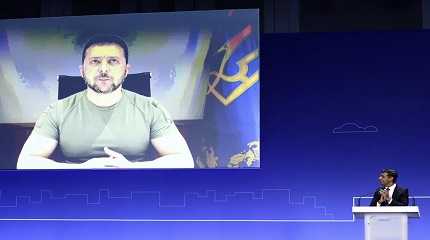
LONDON (AP) — Ukraine’s allies pledged several billion dollars in non-military aid on Wednesday to rebuild its war-ravaged infrastructure, fight corruption and help pave the country’s road to membership in the European Union.
Stressing the vast scale of the task, diplomats and political leaders at the Ukraine Recovery Conference in London urged private-sector companies to invest and revive an economy battered by almost a year and a half of war.
Delegates from more than 60 countries attended the conference, which is both a fundraising forum and a message to Russia that Ukraine’s Western supporters are in it for the long haul.
The World Bank has estimated the cost of the reconstruction at more than $400 billion, a figure rising daily alongside the human toll of Russia’s invasion. Politicians from Europe and the U.S. vowed that Russia would one day be made to pay for the destruction — though officials acknowledged that day is some way off.
Secretary of State Antony Blinken said the U.S. would give more than $1.3 billion in new aid, including more than $500 million to restore and improve Ukraine’s battered energy grid.
European Commission President Ursula von der Leyen announced 50 billion euros ($55 billion) in support through 2027, while Britain pledged 240 million pounds ($305 million) in aid and 3 billion pounds ($3.8 billion) in World Bank loan guarantees for Ukraine. Germany announced a further 381 million euros ($416 million) in humanitarian aid.
Ukraine President Volodymyr Zelenskyy, who addressed delegates by video, said his country needed action, not just pledges.
“We must move from vision to agreements and from agreements to real projects,” he said.
Zelenskyy, who is pushing for Ukraine to join NATO and the European Union, urged Western leaders to have the “courage” to acknowledge that his country is already a key part of their economic and defense alliances.
“We are only waiting for the courage of the alliance leaders to recognize this reality, politically,” he said.
Zelenskyy wants to receive a full commitment from EU leaders when they meet in October on starting membership talks.
Von der Leyen said “I have no doubt that Ukraine will be part of our union,” but stressed that it must still meet conditions before it can start accession talks, including cutting corruption and reforming the judiciary.
“Despite the war, Ukraine has accelerated its reform agenda with impressive speed and resolve,” von der Leyen said. She said such reforms would send “a powerful message” to investors that they will get the “transparency, fairness and the functioning institutions they need to invest in Ukraine.”
Blinken also highlighted the importance of anti-corruption efforts by Ukraine, a country long plagued by graft. He said some of the U.S. money will go toward upgrading ports and border infrastructure and digitizing customs procedures to cut rule-breaking
“The goal is to rebuild a Ukraine that is fit for (the) EU,” said German Foreign Minister Annalena Baerbock, whose country will host another recovery conference next year.
Before the conference, Blinken said postwar Ukraine will need “the strongest possible economy, the strongest possibly democracy” in order to attract the investment it will urgently need.
Many say Ukraine needs the equivalent of the Marshall Plan that helped rebuild Europe after World War II. Its infrastructure had been decimated by Russian attacks even before the collapse of the Kakhovka dam this month after an explosion flooded some 10,000 hectares (25,000 acres) of land and displaced thousands of people.
The conference aims to harness private-sector investment. British Prime Minister Rishi Sunak said BT, Virgin, Philips and Hyundai Engineering are among more than 400 companies from 38 countries that have committed to invest in Ukraine.
Sunak said Ukraine is a “huge investment opportunity” despite the mounting destruction from Russian attacks.
“In fact, the war has only proved how much Ukraine has to offer,” Sunak said, citing Ukraine’s tech sector, which had its best-ever year in 2022.
“As we’ve seen in Bakhmut and Mariupol, what Russia cannot take it will seek to destroy,” Sunak said. “They want to do the same to Ukraine’s economy.
“The scale of the challenge is real, the war brought a 29% fall in Ukraine’s GDP last year, but just look at the streets of Kyiv. Despite the threat of attack, people are getting on with their lives -– and getting on with business.”
Sunak called for investment in technology and green energy to help build “a financially stronger, technologically advanced Ukraine.”
The U.K. also hopes the conference will make progress on setting up wartime risk insurance for companies investing in Ukraine, though it’s unclear how advanced the plans are.
At last year’s recovery conference in Switzerland, Ukraine called for billions in Russian assets frozen by Western countries since the invasion to be used for Ukraine’s recovery.
That is still in the discussion phase in various countries, but Britain took a step in that direction this week, extending sanctions on Russia so that funds can be kept frozen until Ukraine gets compensation for the invasion.
“Let’s be clear: Russia is causing Ukraine’s destruction, and Russia will eventually bear the cost of Ukraine’s reconstruction,” Blinken said.




